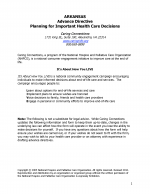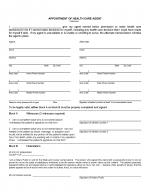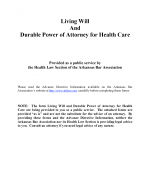An Arkansas advance directive is a document that allows a person (“principal”) to select their medical treatment options in the chance they can’t do so at a later time. The directive also sets out an “agent” that can make health care decisions for the principal. After the form has been signed (either with 2 witnesses or a notary public), it should be placed with family members in case it’s ever needed.
What’s Included?
Signing Requirements (§ 20-6-103 & § 20-17-202) – Either two (2) witnesses or a notary public.
State Definitions
- Advance Directive (§ 20-6-101(6)) – “Advance directive” means an individual instruction or a written statement that anticipates and directs the provision of health care for an individual, including without limitation a living will or a durable power of attorney for health care;
- Medical Power of Attorney (§ 20-6-101(4(a))) – “Durable power of attorney for health care” means a written advance directive that identifies an agent who is authorized to make healthcare decisions on behalf of the principal.
- Living Will (§ 20-6-101(13(a)) – “Living will” means a written advance directive describing the principal’s individual instructions for health care to be provided or withheld in the event that the principal subsequently lacks decision-making capacity.
Versions (4)
Download: Adobe PDF
Download: Adobe PDF
Download: Adobe PDF
 University of Arkansas Medical Sciences Version
University of Arkansas Medical Sciences Version
Download: Adobe PDF
How To Write
Download: PDF
Appointment Of Health Care Agent
(1) Arkansas Declaration. As the Arkansas Principal, you must identify yourself in the statement of intent introducing this appointment.

(2) Agent. The Health Care Agent that you intend to name as your Medical Attorney-in-Fact must have his or her full name presented. This is the Party who shall speak to Arkansas Physicians and Medical Staff with the same authority you carry over your health care decisions.
(3) Arkansas Agent Contact. The Arkansas Medical Attorney-in-Fact name must be coupled with his or her address, city, state, zip code, and home phone number.
(4) Alternate Agent. The possibility of your Arkansas Health Care Agent failing to perform his or her role when you are incapacitated because he or she is either unable to, has been revoked as an Agent, or is unwilling to can drastically effect the medical care you expect. Thus, if desired, record the name of an additional Party who is willing and able to fill the role of your Arkansas Health Care Agent. Such an Alternate Agent will not be able to represent your medical directives unless your initial choice cannot or will not represent your medical directives. If this happens, your Alternate Agent will automatically step into the Health Care Agent or Medical Attorney-in-Fact role
(5) Alternate Agent Contact. The full address and telephone number of your Alternate Agent.

Arkansas Patient Signing
(6) Signature Of Patient. To appoint a Health Care Agent in the State of Arkansas, you must produce a signature that is provable in the future. To this end, you must print your name, report the current date, and sign your name before two Witnesses or a Notary Public.

Witness Or Notary Acknowledgment
(7) Block A Witnesses. The first block beneath your signature has been provided for the signatures of the two Witnesses who have observed your act of signing. Each one must read the testimonial defining their qualifications to act as a Witness and the fact that each has physically watched you sign your name. Upon agreement with this testimony, each Witness must sign his or her name as acknowledgement.
(8) Block B Notarization. If a Notary Public has been obtained to view your signing and subject the signature to the notarization process, then he or she must attend to Block B of this form.

Advance Care Plan
(9) Arkansas Declarant. If you have decided to issue a declaration regarding advance care when incapacitated and unable to communicate, then you must assume the role of the Principal Declarant behind the second portion of the advance directive package. For this task, locate the declaration statement, then produce your full name. If you are completing this form on behalf of the concerned Patient, then report the Patient’s full name.
(10) Arkansas Agent Information. Before proceeding to your directives, report the name, phone number, relationship, and address of your Arkansas Health Care Agent. This document shall specifically name this person to make treatment decisions for you with Arkansas Medical Personnel when you are unable to do so yourself.
(11) Arkansas Alternate Agent Information. If you have an Alternate Agent willing to assume the full role of your Arkansas Health Care Agent should the original appointment be revoked, refuse to represent you, or is unable to act, then you must document the Alternate Agent’s name, phone number, relationship to you, and address.

Quality Of Life And Treatment
(12) Permanent Unconscious Condition. If you have decided to inform Arkansas Doctors that certain results will be unacceptable to maintain an acceptable quality of life. A list of unacceptable living conditions has been provided. To define an unacceptable quality of life as one of these conditions, you must mark the checkbox on its left. The first of these statements should be selected if you wish Arkansas Physicians to be informed that you consider a life where you are permanently unconscious as unacceptable.
(13) Permanent Confusion. To declare that a condition where you are incognizant or unable to process and comprehend your surroundings as an intolerable or unacceptable quality of life then make sure to select the appropriate item from this section.
(14) Dependent In All Activities. If you have determined that a medical scenario where you are unable to care for yourself by carrying out basic daily activities is unacceptable then include this statement by selecting it.
(15) End-Stage Illnesses. Arkansas Physicians will generally seek to maintain or prolong life even during end-state illnesses where death is imminent. You may declare that life-prolonging procedures are unacceptable if you are in this position by selecting the final statement.

Treatment
(16) CPR (Cardiopulmonary Resuscitation). Treatment options for medically traumatic events that leave you in a state where your quality of life will be unacceptable, and your condition is incurable or irreversible can be decided upon. The procedure known as CPR or cardiopulmonary resuscitation is considered an appropriate treatment response when one’s hearts and lungs stop working. You can consent to this treatment when you are unable to communicate by marking or deny it when you are in such a condition by marking the appropriate box in the table provided.
(17) Life Support/Other Artificial Support. In a scenario where you are unable to communicate and are diagnosed with an incurable medical condition, your body (i.e., organs such as your lungs or kidneys) may begin to shut down. Arkansas Physicians and Medical Personnel will, by default, apply life support procedures and machines to prolong life. By marking the “Yes” box you will consent to life support systems put in place when needed to prolong life, however, if you wish to refuse life support in this scenario then you must mark “No.”
(18) Treatment Of New Conditions. The third row of the treatment table considers a case where you contract a new medical condition or disease while near death and unconscious. Utilize the checkboxes in the third row to approve of treatments for new conditions or refuse procedures with the goal of treating a new condition.
(19) Tube Feeding/IV Fluids. Whenever you are unconscious for a long period of time, you run the risk of dehydration or starvation. Arkansas Physicians will naturally wish to avoid this by administering food and water (artificially). You can consent or refuse this treatment when in a near death period by selecting the appropriate box in the final row of the treatment table.

Principal Preference
(20) Other Instructions. Additional directives can be included with this declaration form. Document your wishes regarding topics such as funeral preferences, hospice care, or spiritual/religious observations in the area provided.

(21) Organ Donation. Arkansas will accept your directives regarding organ donation through this document. To indicate your desire to be an organ donor, select the checkbox that best defines what you wish to donate. You can easily solidify the desire to donate any tissue or body part, your entire body, or even provide a list of specific organs or tissues.

Signature
(22) Patient Signature. As the Patient or the Principal Declarant setting your medical treatment preferences to paper above, you must provide a signature that can easily be validated in the future. This means your physical act of signing this document must occur in front of two Witnesses or a licensed Arkansas Notary Public. Gather the appropriate Parties, then sign your name.
(23) Date. The calendar date when you sign this document shall give Reviewers a point of reference as to how recent your signature was produced therefore establishing when you determined the above appointment and/or directives are appropriate and desired. Record this calendar date as soon as you sign your name while the Validating Party (i.e., Witness or Notary Public) watches.

Witnesses
(24) Witness Testimony. As mentioned, your signing must be shown to be made by you while you are cognizant of your surroundings. Two Witnesses can easily testify to this fact by signing their names in agreement to statement provided. Each Witness has been provided with a unique signature line to agree to the account on its left.
Notarization
(25) Signature Notarization. If you are unable to obtain two Witnesses who meet the stated requirements for this role, then you must sign your name before a Notary Public with an active and recognized license. He or she will physically watch you sign the above paperwork so that a valid testimony can be provided through the notarization process.

Colorado POLST Introduction
(26) Patient Information. The final form in this package must be filled out by a licensed Physician in the State of Arkansas. The POLST will be attached to the Patient’s records to present his or her Physician-approved medical directives as an Arkansas Doctor’s orders. Naturally, the Patient’s full name, birthday, and gender must be supplied to the first page of the POLST.
(27) Physician. As discussed, an Arkansas licensed Physician must discuss and approve of the Patient’s wishes. This Physician must be identified by name and have his or her phone number attached.
(28) Patient’s Additional Contact. The Patient’s contact information must be presented with his or her printed name and phone number.

Physician Orders For Life-Sustaining Treatment
(29) Arkansas Patient Identity. The top of the POLST form must display the Patient’s full name, the day this form was prepared by the Patient and Physician, and the Patient’s date of birth.

A. Cardiopulmonary Resuscitation (CPR)
(30) Cardiopulmonary Resuscitation (CPR). The first topic of discussion is that of CPR. Commonly known as cardiopulmonary resuscitation, this procedure is meant to restart your heart or lungs if they stop functioning. You can either pre-approve of the attempt to resuscitate you or refuse this treatment when your cardiopulmonary system fails by selecting the appropriate checkbox.

B. Medical Interventions
(31) Full Treatment. The level of intervention you wish Arkansas Physicians and Responders to employ when you are found unconscious, with a pulse/breathing, and suffering a traumatic medical event. You can elect to receive the full scope of available treatment to maintain your life (including intubation) if you solidify your consent to receive it through this form. The option to accept full treatment for only a trial period to see if your body can recover is also available.
(32) Selective Treatment. You may believe that selective treatment is more appropriated. If so, you can establish this level of medical intervention through the statement provided. This statement also allows you to provide consent for a transfer to a hospital only for comfort care.
(33) Comfort Treatment. You can inform Arkansas Physicians that treatment goals should focus on keeping you comfortable rather than a prolonging of life.

C. Additional Orders
(34) Other Declarant Directives. If you would like to add any instructions or provisions to your medical care, then use the area provided to include this information. This area can be used to further define your medical intervention preferences such as the length of time a trial period of full treatment bears approval before discontinuing life prolonging treatment.

D. Information And Signatures
(35) Declarant Classification. The Arkansas Physician must indicate who he or she has discussed the Patient’s wishes with before this document can be signed by the attending Physician. The Arkansas Physician can indicate if the Patient’s form is being executed with the Patient or, if the Patient lacks the capacity, this document is being executed with the Legal Representative of the Patient.
(36) Advance Directive Status. If the Patient has an Advance Directive that the Arkansas Physician has reviewed, this should be indicated along with the date of the concerned directive. Otherwise the Physician must report if the Patient has an Advance Directive but it is not available or if the Patient does not have an Advanced Directive.

Signature Of Physician
(37) Physician Identity And Relationship. The Physician’s printed name, telephone number, and Physician License number must be documented before he or she proceeds with the signing.
(38) Physician Signature. The Arkansas Physician must sign and date this document upon completion.

Signature Of Patient Or Legal Representative
(39) Arkansas Patient Identity. In addition to the Arkansas Physician, the Patient must confirm this document by signature. Before doing so, the Patient must produce his or her printed name. If the Signature Party is a Representative of the Patient, then his or her relationship to the Patient must be recorded. If the Patient is personally attending to this document, then the word ‘self’ can be used to define this relationship.
(40) Patient Signature. The signature and signature date of the Patient must be presented to prove his or her approval.
(41) Patient Contact Material. The mailing address and telephone number of the Patient should be displayed directly underneath his or her name.



